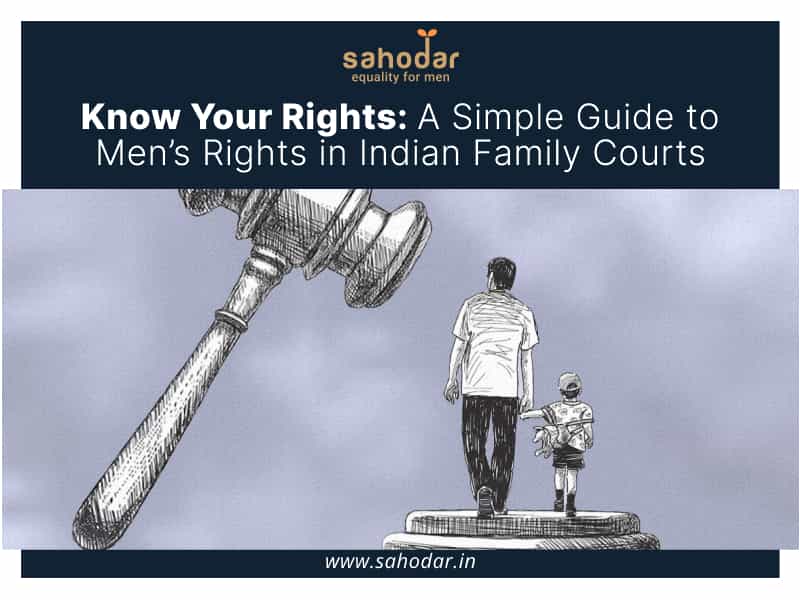The dynamics of family court proceedings in India have seen a significant shift over the years, moving towards a more equitable and just system. However, concerns persist regarding protecting and recognising men’s rights in family court matters. In this detailed exploration, we will delve into the legal intricacies of Men’s Rights in Indian Family Courts, covering marriage, divorce, alimony, child custody, false allegations, and the evolving landscape of fatherhood in adoption and guardianship.
Men’s Rights in Indian Family Courts
Equal Rights in Marriage and Divorce
In the Indian legal system, marriage is considered a contract, and divorce is a legal dissolution of that contract. The principle of equality is enshrined in the Constitution of India, and family laws gradually align with this fundamental right. Both men and women have the right to initiate divorce proceedings, and the grounds for divorce are gender-neutral.
Alimony and Maintenance Laws
Traditionally, alimony and maintenance were associated predominantly with women. However, the legal framework is evolving to be more inclusive. Men now have the right to claim alimony or maintenance from their spouses in case of divorce. Section 25 of the Hindu Marriage Act and Section 125 of the Code of Criminal Procedure (CrPC) are two key provisions addressing the maintenance issue. These sections empower family courts to award maintenance to either spouse based on financial need and the other party’s capacity to pay.
The burden of proof lies with the party seeking maintenance, and the court considers factors such as income, property, and financial liabilities. Men, like women, must present a strong case highlighting their economic dependence on their spouse and the necessity of financial support post-divorce.
Child Custody Battles
Child custody battles are emotionally charged and complex, with the primary consideration being the best interests of the child. The Hindu Minority and Guardianship Act and the Guardians and Wards Act govern matters related to child custody.
Both parents, irrespective of gender, have the right to seek custody and visitation rights. Courts assess various factors, including the financial stability, emotional well-being, and overall environment each parent provides. It is crucial for fathers to actively participate in their child’s life and present a compelling case demonstrating their ability to provide a nurturing and stable environment.
Protection Against False Allegations
False allegations in family court cases, such as charges of domestic violence, cruelty, or dowry harassment, can significantly impact an individual’s life. The legal system acknowledges the need to protect individuals from baseless accusations. Section 340 of the Code of Criminal Procedure allows the court to initiate proceedings against individuals for giving false evidence or making a false statement. This provision can address false allegations made during family court proceedings.
Men facing false accusations must gather evidence to refute the claims and, if necessary, file a counter-case for defamation or false prosecution. The legal system needs to strike a balance, ensuring that genuine cases are addressed while preventing the misuse of legal provisions.
Fatherhood in Adoption and Guardianship
Traditionally, the role of fathers in adoption and guardianship matters has been overshadowed by maternal preferences. However, the legal landscape is evolving to recognise the importance of a father’s role in a child’s life. The Hindu Adoption and Maintenance Act and the Guardians and Wards Act provide avenues for fathers to seek adoption or guardianship.
Fathers have the right to adopt a child in certain circumstances, such as when the biological mother is deceased or has completely and finally renounced the world or has abandoned the child. In cases where the birth mother is unable or unwilling to care for the child, fathers can seek guardianship, emphasising the growing acknowledgement of fathers as significant caregivers.
Challenges and Legal Safeguards
Despite the positive legal developments, challenges persist, often stemming from societal biases and stereotypes. To address these challenges, it is essential to strengthen legal safeguards and create awareness:
- Raising Awareness: Men must know their legal rights and remedies. Legal literacy programs and awareness campaigns can help individuals understand their rights and responsibilities in family court proceedings.
- Challenging Stereotypes: Biases and stereotypes can influence court decisions. Legal professionals, advocacy groups, and the media are crucial in challenging these stereotypes and promoting a fair and unbiased legal system.
- Strengthening Support Systems: Men’s rights organisations and support groups can provide emotional, legal, and psychological support to individuals navigating family court battles. These groups can also advocate for policy changes that ensure equal protection under the law.
Conclusion
In conclusion, men’s rights in family courts in India have evolved, reflecting a more inclusive and equitable legal landscape. Legal provisions now recognise the diverse roles and responsibilities of men and women in familial matters. However, challenges persist, necessitating ongoing efforts to promote awareness, challenge stereotypes, and strengthen support systems.
As we navigate the complexities of family court proceedings, it is crucial to remember that the pursuit of justice is a collective responsibility. By fostering legal literacy, challenging biases, and advocating for a fair and just legal system, we contribute to a society where family court decisions are guided by principles of equality, fairness, and the best interests of all parties involved.

